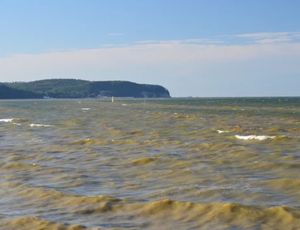
A project led by Dr hab. Dariusz Dziga, Prof. UJ from the Jagiellonian University Faculty of Biochemistry, Biophysics and Biotechnology has received funding within the framework of the DAINA 2 call organised jointly by the Polish National Research Centre and the Research Council of Lithuania. JU scientists will collaborate with a team led by Dr. Sigitas Silcius from the Nature Research Centre in Vilnius.
The project Wirusowa kontrola zakwitów sinic w ekosystemach wód słodkich [Viral control of toxic cyanobacterial blooms in freshwater ecosystems] will entail research on cyanophages – viruses that infect cyanobacteria. They are one of the major forces in the microbiological freshwater ecosystem due to their particularity about their hosts, ability to slow the growth and metabolic rates of infected cells and the lysis that occurs after the replication of viral progeny ends. As of now, our knowledge of the interactions between cyanophages and cyanobacteria and their relationship with other species is very limited.
‘Cyanophages (viruses infecting cyanobacteria) are considered to be key players in structuring microbial communities due to their host-specificity, ability to suppress host metabolism and growth, and subsequent lysis of host cells after completion of their viral replication. Yet we know practically nothing about how cyanophage-cyanobacterium interactions influence interspecies relationships (e.g., competition between two cyanobacterial species) and their dynamics within the community. Using bloom-forming freshwater cyanobacteria as a model system we propose to study the interactions between ecologically important species and the cyanophages that infect them to gain an understanding of the mechanisms through which viruses influences cyanobacterial bloom dynamics. We aim to assess how and to what extent cyanophage infection and lysis contributes to i) the carbon and energy flow in the infected/resistant cyanobacterial strains; ii) the shift in species composition and dominant taxa resulting in the modification of cyanobacterial blooms composition and dynamic. The project will combine a set of laboratory-based co-cultivation experiments and field sampling campaigns supplemented by sophisticated bioinformatics and statistical methods. The study will provide insights into how cyaophage-cyanobacteria interactions influence cyanobacteria community diversity and succession. This is important for both, the fundamental understanding of the functioning of the lower part (microbial) food web and for the practical applications of risk assessment and management of harmful freshwater cyanobacterial blooms. Furthermore, this study has a potential for uncovering previously unrecognised mechanisms of virus-host-competitor relationships, which will improve our fundamental knowledge about the functioning of the aquatic microbial food webs’, reads the project’s description.
Moreover, researchers hope that the results of their study will supply them with new data on the mechanisms of interaction between viruses and their hosts, which will greatly contribute to the basic knowledge of freshwater ecosystems and the food chain.
More information on the call can be found at the National Research Centre website.





